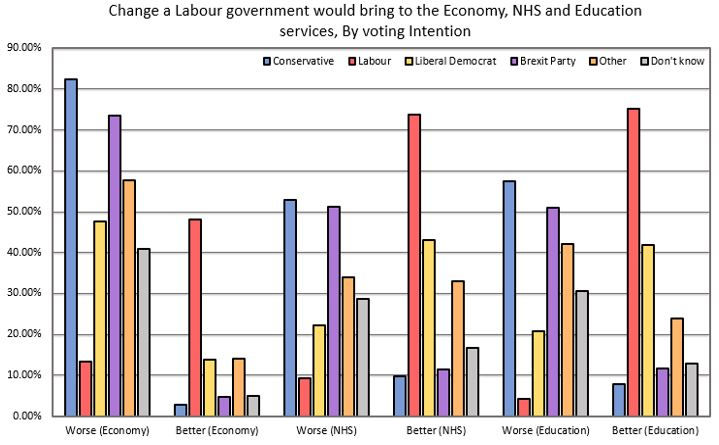How bad economics contributed to Labour’s defeat in 2019
- Capture Politics
- Dec 14, 2020
- 4 min read
Updated: Apr 16, 2021

#Labour’s #2019defeat has been put down to mostly #Brexit and leadership factors by many commentators. This article looks at some other less considered factors.
"It can be said voters who left Labour for the Conservative Party clearly felt Labour lacked economic credibility. These voters felt Labour would redistribute too much, tax and spend to a much higher level than they would like..."
What has gained less attention is the effect Labour’s radical #manifesto may have had upon the #election outcome. In 1983 Labour’s radical left-wing manifesto, which contained many transformative economic policies, was argued to be a major reason why they lost the election so badly. Yet, in 2019 due to Brexit and internal party problems, economic policies have not been explored as much as they were in 1983. This article briefly outlines how bad economic policies might partly explain why Labour lost the election so badly.
Were Labour trusted to manage the economy?
#PollingAnalysis has shown that Labour has not been more trusted to manage the economy compared to the #ConservativeParty since the 2007/08 financial crisis hit. However, when delving into the #BritishElectionStudy (BES) there is much more detail behind why Labour is not trusted on the economy. Going into the election over half the electorate thought a Labour government would actively make the economy worse. Yet, when the public began to find more out about their economic policies they trusted the Labour Party even less in their ability to handle economic affairs. Therefore, as Labour released more details about their radical economic policies, and ever-growing spending commitments, the public increasingly felt Labour had less economic credibility. Moreover, the public was particularly concerned about the effects of such large spending commitments on #inflation, which can be summarised through thoughts over the cost of living. By the end of the election over 70% of #voters felt Labour would increase the cost of living, and as a result, would make them worse off.
These feelings might have been driven by a manifesto that made voters fearful that Labour was not being realistic in their spending commitments, and therefore could not be trusted with taxpayers money and control over many aspects of their livelihoods. Moreover, these feelings, regardless of their origin, are important because voters who stated they felt Labour could make things worse, a majority of the electorate, also stated a much lower likelihood of considering voting Labour throughout the election. Therefore, the perception that Labour’s leadership and economic policies could make things worse likely did limit Labour’s ability to perform well in the last election.

Figure 1: Shows how poor perceptions regarding Labour’s economic credibility correlated with a voter stating a lower likelihood of considering to back Labour, especially when compared to the Conservatives.
Table 3: Shows that the electorate viewed Labour as very strongly #ProRedistribution. & Tables 4-5, 2017 Labour voter’s views on Labour’s economic position, and its likely effect on their lives, and their 2019 vote. Source: 2019 BES.
Along with the previous indications, there is further evidence that a lack of economic credibility hurt Labour’s election prospects. When isolating people who voted Labour in the 2017 election, and then breaking these voters into how they voted in 2019, it can be said voters who left Labour for the Conservative Party clearly felt Labour lacked economic credibility. These voters felt Labour would redistribute too much, tax and spend to a much higher level than they would like and mostly felt Labour would make the economy, and their cost of living, worse. In fact, 90% of voters who switched from Labour to the Conservatives felt Labour would not improve the economy, meaning they felt their economic policies would not make a positive difference to their lives. 72% out of this group felt Labour would actively make things worse when implementing their policies.
The 2017 Labour voters who stayed with the party felt Labour were significantly more #ProTax and spend than compared to voters who left for the Tories, but these voters appear to be more supportive of wider investment measures. However, it should be noted that there were simply not enough of these voters to give Labour a strong economic voting base.
Overall
From a quick analysis of information, the BES can provide us it can be said that there is a real possibility that Labour’s perceived bad economics could have damaged their economic credibility and from this their chances of winning the election. The BES indicated the more voters learnt about Labour’s manifesto the less they became inclined to feel their economic policies were credible and going to benefit them. Moreover, voters who Labour needed to keep from their 2017 election base left Labour and did have concerns over their economic credibility whilst doing so. Further, Labour became seen as much more distant from the voters most likely to leave them for the Tories, especially on tax and spend issues, than compared to the perceived Conservative Party position. This indicates that their heavy tax and spend agenda might have driven away from the very voters they need to keep, whilst also making it harder for them to gain other voters support. Consequently, a brief analysis of the BES does highlight the potential that economic factors might have partly cost Labour the election. Whilst the economy was clearly not the only factor that shaped Labour’s defeat this article would argue that Labour being perceived to get it wrong on the economy, in the eyes of the key voters at least, can be argued to have played a part in Labour’s downfall.
Going Forwards
Therefore, Labour may need to abandon the ideological commitment to transformative economic policies if the party is to regain the voters it lost in 2019, win over key #SwingVoters and get back into government.
Comments